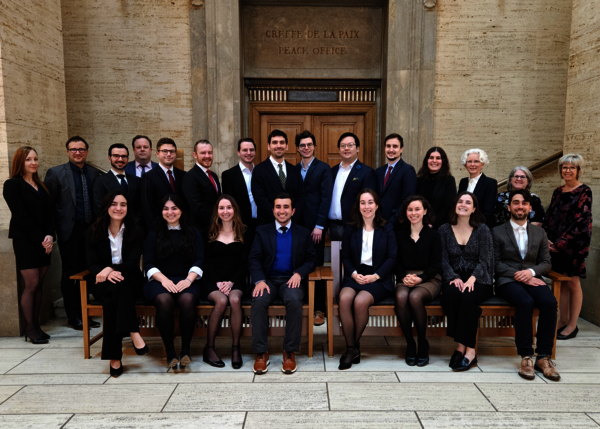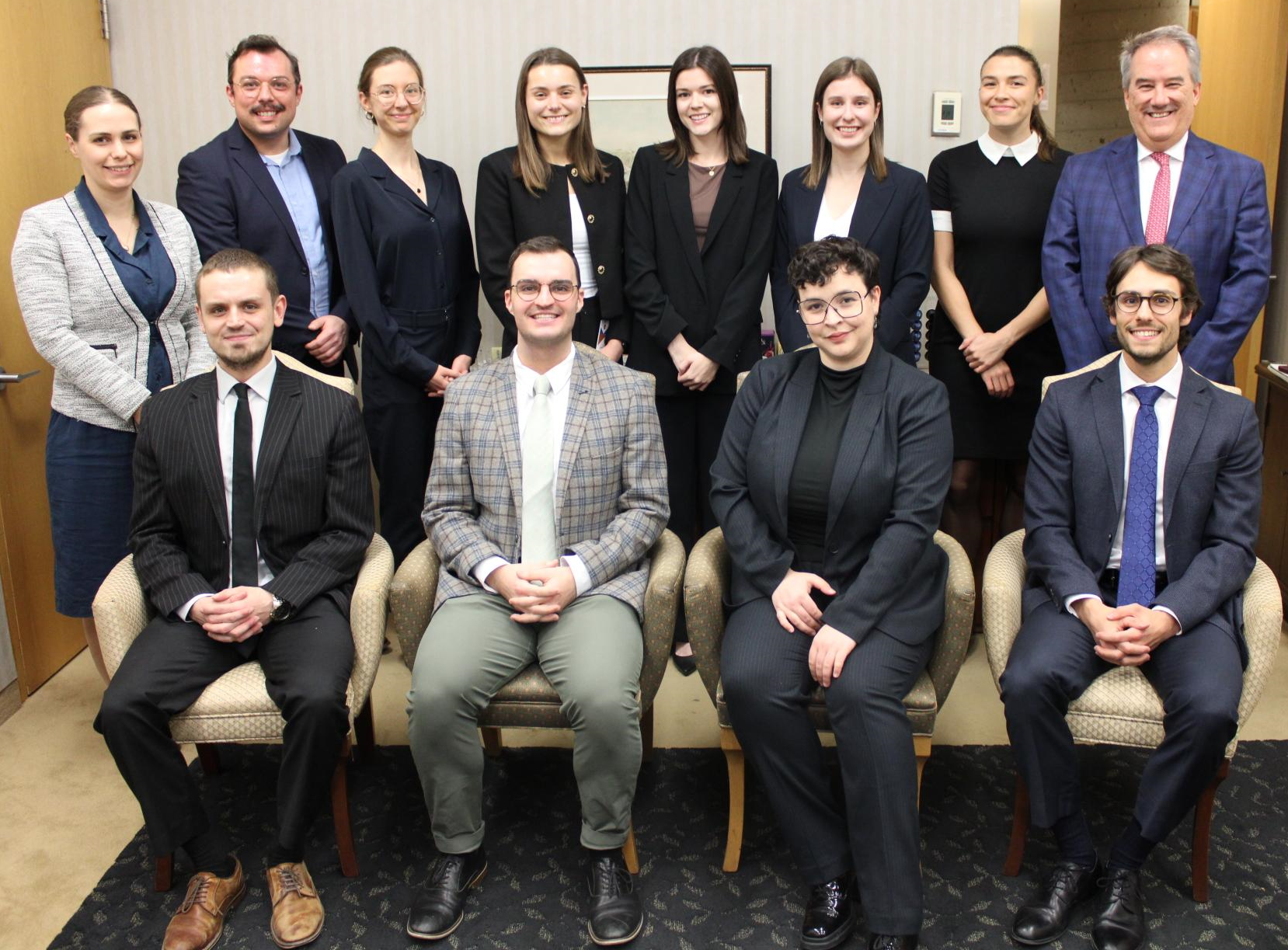The Quebec Court of Appeal’s team of law clerks is made up of approximately 30 people, some at the Court’s Montreal seat and others at its Quebec City seat. Each seat has a coordinator who ensures that the selection process runs smoothly, oversees the training and integration of articling students within the team and offers them juridical support. Each seat also benefits from the assistance of a senior research lawyer for the preparation of large-scale appeals.
Clerkships last two years, with law clerks working the first six months as articling students in fulfilment of the Quebec Bar’s articling requirements, and then as research lawyers. This top-notch training experience provides law clerks with the opportunity to acquire excellent legal skills at the very outset of their careers.
For the most part, law clerks are selected one year in advance; a call for applications is posted each fall and interviews are held in February. Clerkships generally start in January or June. Candidates must be eligible for Quebec Bar articling by the time they start their clerkship.
Call for applications
We are currently accepting applications for clerkships. For more information:
Avis de concours 2026 [Only in French]
What is the role of a Court of Appeal law clerk?
While at the Court of Appeal, law clerks work closely with one judge whom they assist in the performance of the judge’s functions and with whom they will develop a privileged relationship.
Law clerks follow the progress of cases assigned to them until a judgment is rendered. They perform a variety of stimulating tasks, including:
Conducting in-depth legal and evidentiary analyses of the appeal cases assigned to them;
Formulating legal opinions on the outcome of the various grounds of appeal submitted by the parties;
Providing judges with support at the various stages of an appeal file;
Attending hearings in the files on which they have worked;
Conducting additional research and verifications during the deliberation process;
Providing support to the judges by reviewing draft reasons and commenting on their content and form.
Law clerks are also called upon to assist judges through in-depth analytical discussions about the various cases on which they are working.
What can a clerkship at the Court of Appeal offer me?
A position at the Court of Appeal provides a unique opportunity to work behind the scenes of the judicial system and learn how it functions.
Clerking at the Court of Appeal is a well respected and instructive experience. It provides insight into the role of judges and the decision-making process, as well as an opportunity for personalized mentoring by one of the judges of the Court of Appeal.
During a clerkship, clerks also have the opportunity to:
Work on large-scale, complex cases involving major legal and social issues, and to do so from the very outset of their careers;
Develop knowledge in a wide variety of legal fields, including constitutional law, criminal law, administrative law, civil law, business law, family law, international law, and environmental law;
Acquire sharp legal reflexes and great versatility;
Follow the progress of cases from the beginning of the appellate process until a judgment is rendered;
Attend numerous appeal hearings;
Develop skills in formulating legal arguments, both orally and in writing;
Develop strategies for successfully managing litigation files.
Clerking at the Court of Appeal can also be used to earn equivalence credits for certain graduate programs under agreements with Université Laval and Université de Montréal.
What employment opportunities are there after clerking at the Court of Appeal?
Those who have clerked at the Court of Appeal are sought-after candidates for employment. In recent years, lawyers who have held such a position have been offered employment opportunities in a variety of settings, including:
At the Supreme Court of Canada;
In courts and administrative tribunals;
In law firms of all sizes, serving clients in a variety of legal fields;
In the federal or provincial public service;
In the office of the Director of Criminal and Penal Prosecutions;
As defence counsel;
In the office of the Attorney General of Quebec or the Attorney General of Canada;
In governmental or para-governmental organizations;
As in-house counsel;
In universities.
What type of candidates are you looking for?
The Court of Appeal is looking for candidates with solid academic records and excellent research and drafting skills. Moreover, in performing their duties, they must be inquisitive and thorough, and demonstrate maturity and autonomy.
The common working language is French. An understanding of English is required, as the documents in some appeal records are partially or entirely in English and as candidates must be able to read and use legislative, jurisprudential and doctrinal sources that are available only in English in several areas of the law.
What must I include with my application?
A complete application must include the following documents:
- The Application Form (available on the Court’s website).
- A cover letter explaining your interest in the position.
- An up-to-date curriculum vitae.
- Two letters of reference (one of which should, preferably, be from a law professor). The individuals providing a letter of reference should send their letter directly to the Court of Appeal by mail or email to the addresses indicated below. Letters must be signed and must be addressed to the attention of the Honourable Marie-France Bich, J.A., for positions in Montreal, and to the Honourable Jocelyn F. Rancourt, J.A., for positions in Quebec City.
- Scanned copies (PDF) of law school transcripts (undergraduate and graduate, as applicable). Official transcripts will be required only from those who are offered a clerkship.
- Scanned copies (PDF) of transcripts:
- for all university studies other than law;
- from the École du Barreau, if applicable.
- for all university studies other than law;
- A copy of a law school research paper. The research paper may be a group project, in which case the section(s) written by you must be clearly indicated. Factums prepared for a moot court or a mooting competition are not accepted.
- A copy of your proof of permanent residency, if applicable.
Article by the Honourable Shaun Finn, J.S.C., on his experience clerking at the Court of Appeal
The Honourable Shaun Finn, J.S.C., who clerked at the Court of Appeal, wrote an article in December 2005 about the Court of Appeal clerkship program. The article, entitled “A Passionate Appeal”, is available here.

Second row (from left to right) : Sophie Asselin; Laurent Ouellet (Research Services Coordinator, Montreal seat); Gustave Warby; Olivier Henripin; Guillaume Savard; Riley Klassen-Molyneaux; Harold Martin; Maxime Varin; Aymeric Tardif; David Xing; Arthur Scalabrini; Iulia Anescu; Honourable Marie-France Bich (Coordinating judge of the Research Services, seat of Montréal); Bettina Karpel (Jurilinguist); Ginette Landry (assistant)
Teams of law clerks - Fall 2024
Group photo of the law clerks, Montreal Seat

Second row (from left to right): Chloé R.-Duchesne (Research Services Coordinator, Quebec City seat); Marc-Olivier Goulet; Michelle Albert-Rochette; Marie Dion-Cliche; Sarah-Maude Bélanger; Anne-Sophie Harvey; Camille Lavoie-Rancourt; Honourable Jocelyn F. Rancourt (Coordinating judge of the Research Services, Quebec City seat).
Groupe photo of the law clerks, Quebec City Seat
